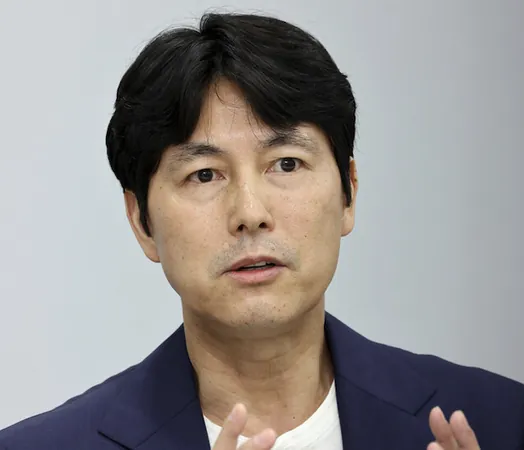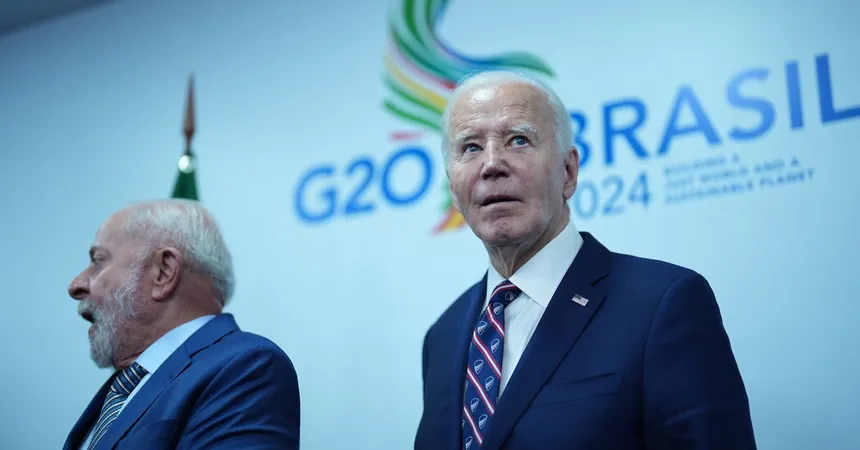
Walmart’s Decision to Roll Back DEI Policies Marks a Dramatic Turning Point in Corporate America
2024-11-27
Author: Michael
Introduction
In a significant shift that reflects changing dynamics in corporate America, Walmart—known as the world's largest retailer—recently announced a major rollback of its diversity, equity, and inclusion (DEI) initiatives. This development signals a broader trend among U.S. companies reevaluating their commitments to diversity in light of potential legal and political repercussions, particularly following the election of Donald Trump.
Legal Challenges and Policy Changes
The announcement comes on the heels of a series of legal battles won by conservative groups, which have launched numerous lawsuits against corporate DEI programs that aim to uplift historically under-represented communities. With Trump’s administration poised to further dismantle such programs, Walmart's decision aligns with the growing caution among companies wary of “reverse discrimination” claims.
Details of Walmart’s New Policies
As part of their new policies, Walmart revealed it would no longer prioritize suppliers owned by women or minorities. It also discontinued a five-year commitment to a racial equity center established after the tragic killing of George Floyd in 2020 and withdrew from a key LGBTQ+ rights index.
Reassessment of Corporate DEI Efforts
Experts attribute this shift largely to increased legal risks faced by companies following a U.S. Supreme Court ruling in June 2023 that effectively ended affirmative action in college admissions. Since that landmark decision, conservative organizations have leveraged similar legal arguments to achieve victories against corporate diversity initiatives. Recently, the Wisconsin Institute for Law & Liberty successfully challenged the U.S. Department of Transportation's preference for minority-owned businesses in contract awards, setting a precedent that could influence other corporate policies.
Expert Insights
According to Dan Lennington, a deputy counsel at the Institute, a significant reassessment is underway among companies as they navigate a legal landscape increasingly hostile towards traditional DEI efforts. "All branches of the federal government are now leaning towards equality, emphasizing individual treatment rather than group-based considerations," he noted.
Political Climate and Engagement
The impending return of figures like Stephen Miller to the Trump administration is expected to intensify scrutiny and pushback against DEI initiatives. Legal experts like Jason Schwartz believe the impact of these changes on corporate America cannot be underestimated. Many companies are caught in a delicate balancing act—endeavoring to maintain an inclusive environment while also appeasing segments of their workforce who may have differing opinions on these policies.
Reactions from Civil Rights Advocates
The response from civil rights advocates has been mixed. Marc Morial, CEO of the National Urban League, expressed shock at Walmart’s decision, labeling it "stunning" and inconsistent with the retailer's past commitments to diversity. He highlighted that DEI policies are essential for compliance with federal anti-discrimination laws and warned against labeling such initiatives as favoritism.
Shifting Employee Sentiment
Amidst this changing landscape, a Pew Research Center survey indicates a slight decline in employee support for diversity measures, with only 52% viewing them favorably—a dip from 56% earlier in the year. This trend has sparked fears that Walmart's decision may prompt other companies to retreat from DEI commitments as well. Nevertheless, experts like David Glasgow of NYU stress that many organizations are quietly continuing their DEI efforts, particularly those that understand the value of fostering diverse workplaces in today's competitive market.
Walmart's Supplier Relationships
Walmart assured stakeholders that it would maintain its relationships with a wide array of suppliers, having previously sourced over $13 billion in goods and services from diverse businesses. Although the company may be shifting its stated goals, there are expectations that the demand for diverse partnerships will persist due to customer expectations.
Influence of Conservative Commentary
Interestingly, Walmart’s announcement coincided with outreach from conservative commentator Robby Starbuck, who has vocally criticized corporate DEI strategies. His influence over other companies, including Ford and Harley-Davidson, to dial back on similar initiatives has raised concerns regarding what many see as a coordinated effort against diversity programs in various sectors.
Regulatory Changes in Marketplace
Furthermore, Walmart is tightening its regulations on items sold through its third-party marketplace, ensuring that they do not promote sexual and transgender products aimed at minors. Additionally, the retailer has ceased its participation in the Human Rights Campaign's annual benchmark for LGBTQ+ workplace inclusion.
Critics' Concerns
Critics argue that as companies distance themselves from DEI commitments, they risk alienating significant consumer groups. RaShawn Hawkins from the HRC Foundation warns that such retreats are neglecting the vital responsibilities owed to employees and shareholders alike. With the purchasing power of LGBTQ+ customers continuously rising, the future may hold unpredictable outcomes for corporations that choose to disregard inclusivity.
Conclusion
In summary, Walmart's rollback of DEI policies is not an isolated incident but a part of a broader narrative playing out in corporate America as businesses navigate the complex intersection of social responsibility, legal risks, and evolving consumer expectations. The outcome of this shift will certainly influence corporate governance in the years to come.









 Brasil (PT)
Brasil (PT)
 Canada (EN)
Canada (EN)
 Chile (ES)
Chile (ES)
 España (ES)
España (ES)
 France (FR)
France (FR)
 Hong Kong (EN)
Hong Kong (EN)
 Italia (IT)
Italia (IT)
 日本 (JA)
日本 (JA)
 Magyarország (HU)
Magyarország (HU)
 Norge (NO)
Norge (NO)
 Polska (PL)
Polska (PL)
 Schweiz (DE)
Schweiz (DE)
 Singapore (EN)
Singapore (EN)
 Sverige (SV)
Sverige (SV)
 Suomi (FI)
Suomi (FI)
 Türkiye (TR)
Türkiye (TR)